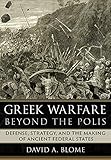Greek Warfare beyond the Polis : Defense, Strategy, and the Making of Ancient Federal States / David A. Blome.
Material type: TextPublisher: Ithaca, NY : Cornell University Press, [2020]Copyright date: ©2021Description: 1 online resource (168 p.) : 5 mapsContent type:
TextPublisher: Ithaca, NY : Cornell University Press, [2020]Copyright date: ©2021Description: 1 online resource (168 p.) : 5 mapsContent type: - 9781501747526
- 9781501747625
- Federal government -- Greece -- History -- To 1500
- Military art and science -- Greece -- History -- To 1500
- Politics and war -- Greece -- History -- To 1500
- War and society -- Greece -- History -- To 1500
- Ancient History & Classical Studies
- Military History
- West European History
- HISTORY / Ancient / Greece
- Antiquity, Warfare, Greece, Federalism, Ancient Warfare
- 355.40938 23
- DF89 .B65 2020
- online - DeGruyter
| Item type | Current library | Call number | URL | Status | Notes | Barcode | |
|---|---|---|---|---|---|---|---|
 eBook
eBook
|
Biblioteca "Angelicum" Pont. Univ. S.Tommaso d'Aquino Nuvola online | online - DeGruyter (Browse shelf(Opens below)) | Online access | Not for loan (Accesso limitato) | Accesso per gli utenti autorizzati / Access for authorized users | (dgr)9781501747625 |
Browsing Biblioteca "Angelicum" Pont. Univ. S.Tommaso d'Aquino shelves, Shelving location: Nuvola online Close shelf browser (Hides shelf browser)

|

|

|

|

|

|

|
||
| online - DeGruyter Skis in the Art of War / | online - DeGruyter The Basque Seroras : Local Religion, Gender, and Power in Northern Iberia, 1550-1800 / | online - DeGruyter The Frontier Effect : State Formation and Violence in Colombia / | online - DeGruyter Greek Warfare beyond the Polis : Defense, Strategy, and the Making of Ancient Federal States / | online - DeGruyter Stolen Song : How the Troubadours Became French / | online - DeGruyter Illegible : A Novel / | online - DeGruyter The House of Hemp and Butter : A History of Old Riga / |
Frontmatter -- Contents -- Preface: The Iliad in Iraq -- Introduction -- 1. The Phocian Chalk Raid of the Thessalian Camp Circa 490 -- 2. The Aetolian Rout of the Athenians in 426 -- 3. The Defense of Acarnania in 389 -- 4. The Defense of Arcadia in 370 -- Conclusion -- Notes -- References -- Index
restricted access online access with authorization star
http://purl.org/coar/access_right/c_16ec
Greek Warfare beyond the Polis assesses the nature and broader significance of warfare in the mountains of classical Greece. Based on detailed reconstructions of four unconventional military encounters, David A. Blome argues that the upland Greeks of the classical mainland developed defensive strategies to guard against external aggression. These strategies enabled wide-scale, sophisticated actions in response to invasions, but they did not require the direction of a central, federal government. Blome brings these strategies to the forefront by driving ancient Greek military history and ancient Greek scholarship "beyond the polis" into dialogue with each other. As he contends, beyond-the-polis scholarship has done much to expand and refine our understanding of the ancient Greek world, but it has overemphasized the importance of political institutions in emergent federal states and has yet to treat warfare involving upland Greeks systematically or in depth. In contrast, Greek Warfare beyond the Polis scrutinizes the socio-political roots of warfare from beyond the polis, which are often neglected in military histories of the Greek city-state. By focusing on the significance of warfare vis-à-vis the socio-political development of upland polities, Blome shows that although the more powerful states of the classical Greek world were dismissive or ignorant of the military capabilities of upland Greeks, the reverse was not the case. The Phocians, Aetolians, Acarnanians, and Arcadians ca.490–362 BCE were well aware of the arrogant attitudes of their aggressive neighbors, and as highly efficient political entities, they exploited these attitudes to great effect.
Mode of access: Internet via World Wide Web.
In English.
Description based on online resource; title from PDF title page (publisher's Web site, viewed 01. Dez 2022)


